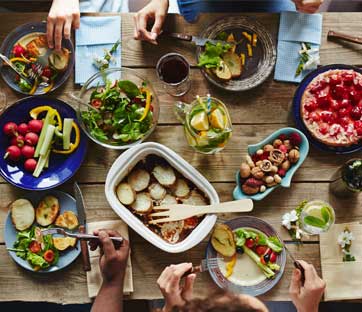UNIVERSITÀ E SCUOLA
A new hypothesis for understanding obesity

David Raubenheimer, Leonard P Ullmann Chair in Nutritional Ecology School of Life and Environmental Sciences at the University of Sydney, is a leading expert in nutritional ecology, the discipline that studies how nutrition-related aspects of an animal's environment interact with its biology to determine health and fitness outcomes. His approach is comparative, using ecological and evolutionary diversity to understand these interactions. His studies of insects, fish, birds and a variety of mammals have helped develop a new approach to human nutrition-related problems, such as the dietary causes of obesity.
He was invited lecturer at the Winter School Food and Health held at the University of Padova from 29th January to 10th February.
Here we publish the interview released to “Il Bo Magazine”.
The title of your talk at the Food and Health Winter School was “Human nutrition: where have we gone wrong and how can we do better?”. I would start from here.
Problems of human nutrition are immense, and they're growing faster than ever. The number of people who die because of malnutrition (which includes over-nutrition, under-nutrition and unbalanced nutrition) is 17.500 a day - that's equivalent to 35 jumbo jets loads of people dying preventable deaths every day! As nutrition scientists, we should be asking where we have gone wrong and how we can do better.
In my lectures, I pointed out that nutrition is hugely complex, involving not just biology, but economics, politics, psychology and a wide range of other disciplines. One way of making nutrition science more effective is to increase the amount of inter-disciplinary work, where scientists with different expertise work in teams to understand why people eat the diets that they do, and how to help them improve their nutrition. But problems as complex as nutrition will not be solved by simply throwing a wider range of expertise at them. What is also needed are new approaches for developing theories about how the many things that are relevant to nutrition – physiology, psychology, economics, politics etc. – fit together to influence our diets and health. At present, not nearly enough theory is applied to the challenge, and this creates problems for the way that we think about diets and nutrition.
One problem is that there is a tendency to think about nutrition as a collection of single chemicals, then argue about which is to blame for what – for example, is fats or is it carbohydrates responsible for obesity? Do sugars or saturated fats cause heart disease? These are not sensible questions, because nutrients do not act in isolation, but in the context of complex mixtures, called foods, meals and diets. We should instead be asking “what are the roles of fats and carbohydrates in obesity, and how do they interact with each other and with other nutrients like proteins?”
In my lectures, I introduced an approach called nutritional ecology, which draws on powerful ecological and evolutionary theory developed over the past century and a half. I showed how the theory from nutritional ecology can help to think more clearly about human diets, and illustrated this with examples where nutritional ecology has provided new insights into human nutrition and suggested solutions to some the massive problems we face in industrialized food environments.
What is your protein leverage hypothesis, how does it tackle this issue?
The protein leverage hypothesis is a good example where ecological and evolutionary theory can guide our thinking in nutrition. Appetite is the gateway between the environment and the nutrients that enter the body to make us healthy or sick. Animals and people need different nutrients for different purposes, and evolutionary theory leads us to suspect we should therefore different appetites for different nutrients. This is exactly what our research has shown: humans, like many other animals, have separate appetites for protein, fat and carbohydrate.
In some circumstances, these appetites work together to help us to eat a balanced diet (about 15% of energy from protein). But if we eat foods and meals with a lower concentration of protein than 15%, for example 10%, we cannot have the right amount of proteins, fat and carbohydrates at the same time and a conflict is set up between those appetites. We could eat the target amount of fats and carbs, but then we would eat too little protein. Alternatively, we could eat the right amount of protein but only by over-eating fats and carbs. What we actually do depends on whether the appetite for fats and carbs or for protein is stronger.
Our studies show that in humans the appetite for protein is the strongest. This means that when we eat low protein diets – for example diets with lots of junk food – our strong protein appetites cause us to over-eat fats and carbs to meet our protein target. This is called protein leverage, because it describes a situation where protein “leverages” the intake of too much fats and carbs.
The protein leverage hypothesis suggests that obesity is caused when people eat low protein diets which cause our strong appetites to over-eat fats and carbs. This provides a very different focus on how we think about the causes of obesity. Firstly, it suggests that we over eat fats and carbs not because of a strong appetite for these nutrients, but because of a strong appetite for protein. Secondly, it identifies a very important question in the search for the causes of the modern obesity epidemic: what is diluting the protein content of our diets to cause us to over eat fats and carbs?
Unbalanced nutrition is connected not only to health problems but also to environmental issues, such as water consumption and environmental stress. What do you think of the possibility of decreasing world's meat consumption?
From a nutritional point of view, meat can make a valuable contribution to the human diet. On the other hand, too much meat is a problem for health, and many people now eat too much meat. It is also a problem for the environment, but the details differ for different animals and farming methods. In general, though, it is far more efficient to farm crops for humans to eat directly, than to feed crops to animals that we then eat.
It has been proposed that some diets can be tuned to our blood types, what do you think about this?
I have two things to say about this. First, there is no question that there can be benefits from personalizing diets, because there are considerable differences between people and some of these differences are reflected in our nutritional needs. Second, there is no scientific basis for linking blood types with nutritional needs. This is equivalent linking personality types to star signs; it might be fun to do, but there is no scientific support whatsoever.
Back in 2013 the UN conference on trade and development entitled its official report: “wake up before it's too late – make agriculture truly sustainable now for food security in a changing climate”. Where are we today?
We are extremely vulnerable today; in fact we are already beginning to suffer from global warming caused by food production and other activities. We have structured much of our food system around the assumption that we live in a constant and ever providing ecology, but this is not the way ecological systems work. On the positive side, there's a growing awareness at every level that this is the case and that a more sustainable food system is needed. However, unless we do something in a concerted way as a global community we will run into serious problems within the near future.
What do you think of an insects-based diet, as a tentative solution to the health and environmental issues just mentioned?
Insects could make an excellent contribution to the human diet in general, as they already do in many cultures. They have good nutritional value, providing high quality proteins, fats and are rich in micronutrients, and far better from an environmental perspective than livestock. For example, according to estimates compiled by the FAO, insects are twice as efficient at converting feed to meat as chicken, four times more efficient than pigs and 12 as efficient as cattle.
Francesco Suman




